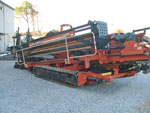Responses from the Trenchless Round Table Discussion in San Antonio, Texas
By Bob Martin - General Manager - January 1, 2009
What impact is the current economic downturn having on the trenchless industry? And what are your predictions for your respective sectors for 2009?
We've heard from the new equipment manufacturers here but I can talk about the used equipment side of things. Things are a little different for my company which markets used equipment worldwide. From a public perspective, things within the industry are looking rather bleak at present due to the transitional stage that we find ourselves in between presidents in the United States but there's going to be a push, as we know, in the very near future for infrastructure. What we're seriously hoping and looking for is a positive change in the near future, hopefully within the next six months. Throughout this time of volatility, the used equipment marketplace is going see very strong demand. People are very cautious right now in regards to where they're spending money. New equipment purchases are being put off - not shelved, but put off for the short-term until people get a better sense of where things are going. But in the meantime work still has to be done. And contractors are coming to us for equipment that will get them by in the short-term. The cheaper equipment, the older equipment, is being sought after. Unfortunately, it is era 2000, 2001 machines that are being sought after, but then there is a huge gap in used equipment between 2002 through 2004, when not a lot of new equipment was manufactured. Demand is extremely high but supply is very low. I think we're going to see a few more players coming into the market with new cheaply priced equipment. Not necessarily anything that can compete with the major HDD manufacturers, but something that will, 'get the job done' and won't be as expensive; something that people will feel more comfortable purchasing in this climate of economic volatility. Used equipment is in high demand, mainly in the small to mid-size machines. Energy infrastructure has flatlined and now comprises perhaps 30% of our business whereas it used to be 70%.
Where are the skills shortages in the industry? And how should they be addressed? Is the industry doing enough training? Are enough contractors available to do the work? Are the prevailing rates of pay in industry adequate for most contractors?
What was touched on earlier is this technology going into other cultures and countries where it is new. But they have the advantage of seeing it with a fresh set of eyes. They can reassess things, start from scratch, and if things need to be changed they can do it at that point, without having to overcome the burden of established doctrine. I think a valuable lesson can be learned from that; it may be nice to be able to step back and look at our own industry with fresh eyes, and I think one of the easiest things to do that we could do to make that happen is to take a look at the new people that are coming in. It was mentioned we have a shortage of younger people coming into this industry, well, even they have a different set of values, a different way of looking at things. They're motivated by different things and fulfilled by different things. All I'm saying is that it's going to be our responsibility to take a step back from our entrenched view of our own industries, and see what we can do to improve them, to change them, even if it requires rebuilding them from the ground up.
What if any, has been or will be the effect of the importation of cheap equipment and materials from China entering the trenchless sector in terms of price and quality?
What was mentioned earlier was the different mentalities, the Chinese versus the North American. It's true to a certain degree. My own company has exported used North American equipment into China half a dozen or a dozen at a time throughout the course of the last two years or so. The reason is because there is a demand in China from the more savvy contractors for high quality equipment. We all know that if you're going to make money you have to have the right people and you have to have the right equipment. There are manufacturers there who have realised that. There is a movement within China towards higher quality equipment even if it means higher prices. We're aware of quite a few of them, and it's not just a matter of them designing better machines, they are actually putting better quality components into them. The first generation Chinese machines were made with inferior steel, with non qualified personnel from components garnered from other industries. But that is all changing; there are actually manufacturers there that are ISO certified, with a dedication to quality. Whereas those first generation machines might have cost 30% of what the cost of a North American equivalent would be, this next generation is maybe 50% to 60%. Twice as expensive, but it's still half the price of a comparable machine here. I think, like some other people here do, that this threat to the North American based manufacturers is a little bit more serious and a little bit more short term than a five year period. I've already seen manufacturers advertising Chinese equipment in North American trade publications. I've been approached by North American contractors looking for Chinese equipment. They're willing to experiment and the catalyst of this is the downturn in the economy. If you don't have US$800,000 to throw at a machine, the US$400,000 dollar option looks pretty good. That's telling me that whereas before people were absolutely insistent on highest quality and performance, today as things are a little tough, they may have no other option, so they're looking seriously at what they can do. So my thought is that the idea of Chinese equipment finding its way into the North American market is closer at hand than we'd like to think.

This commentary is presented for informational purposes only. It is not intended to be a comprehensive or detailed statement on any subject and no representations or warranties, express or implied, are made as to its accuracy, timeliness or completeness. Nothing in this commentary is intended to provide financial, legal, accounting or tax advice nor should it be relied upon. Neither HDD Broker LLC nor the author is liable whatsoever for any loss or damage caused by, or resulting from, any use of or any inaccuracies, errors or omissions in the information provided.


